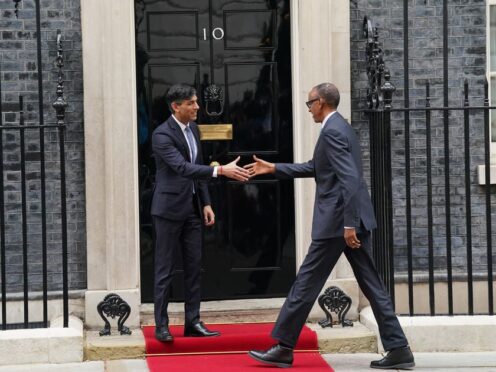The Labour Party has said that the Government plans to send asylum seekers to Rwanda will cost £2 million per person.
In a video posted on social media site X, the party listed a series of things that it said “would cost you, the British taxpayer, less than the £2 million it’s going to cost you to send one asylum seeker to Rwanda. Do you think that’s a good use of your money?”
Labour’s shadow immigration minister Stephen Kinnock has said: “It will cost the UK Government £570m to send 300 people to Rwanda. That’s almost £2m per person.”
Evaluation: Mostly true
If 300 people, or a little more than 300 people, are sent to Rwanda as part of the plan, then Labour is correct to say that the cost per person will be around £2 million. If the scheme lasts until until the 2026/27 financial year and 300 people are sent the more precise cost per person will be £1.97 million.
The milestone of 300 people is written into the deal that the UK has signed with Rwanda, as it is the level at which the UK needs to pay an extra one-off £120 million to the country.
If a lot more than 300 people are transported in this period, then the cost per person will fall. For instance if 2,000 people are sent to Rwanda the cost per person falls to around £450,074.
These calculations do not, however, take into account money that the scheme could save elsewhere. The Government argues that “illegal migration” could cost the taxpayer £11 billion a year by 2026.
The £2 million figure takes into account one-off payments into a fund to help development in Rwanda. Without those payments the cost per person would be in the hundreds of thousands of pounds.
The facts
The claim is based on calculations using figures from a National Audit Office report which was released in early March.
The report breaks down the different costs that the Rwanda policy will entail. Labour’s calculations are based on the costs if 300 people are sent to Rwanda.
The NAO report shows that so far the Government has paid, or is due to pay:
– £120 million in April 2022
– £100 million in April 2023
– £50 million in April 2024
– £50 million in April 2025
– £50 million in April 2026
– £120 million once 300 people have been relocated to Rwanda
These payments to Rwanda will add up to £490 million by the end of the 2026/27 financial year.
The Home Office has so far (February 2024) faced the following costs:
– £2 million in direct staffing costs
– £2.3 million in legal fees
– £15.3 million in set-up costs for escorting people to Rwanda and providing training facilities
These payments have totalled £19.6 million.
The Home Office expects that in future it will face the following costs:
– £1 million per year in staff costs from 2024/25
– £12.6 million for “training escorts in 2024/25
– £1 million per year in costs relating to escorting from 2024/25
– £8.2 million in escorting costs for the remainder of 2023/24
These payments to Rwanda will add up to £26.8 million by the end of the 2026/27 financial year. This assumes that the £1 million annual costs are also paid in the 2024/25 financial year.
There will also be costs for every person sent to Rwanda:
– £20,000 paid to Rwanda after each person is relocated
– £150,874 for “asylum processing and operational costs … and to provide an integration package.” This is paid in instalments over five years.
– £11,000 for flights (including chartering and fuel)
This adds up to £181,874 per person, or a combined £54,562,200 (£54.6 million) if 300 people are sent to Rwanda.
This means that all cost categories added together will be:
£490 million + £19.6 million + £26.8 million + £54,562,200 (for 300 people) = £590,962,200.
In correspondence with the PA news agency, Labour said that it had not included the two £1 million annual costs in its calculations, nor had it included the £8.2 million in future escorting costs, leaving it with a slightly lower total figure of around £576.8 million.
How much would this cost per person?
Divided by 300 people, this would cost £1,969,874 per person, or just under £2 million.
If one assumes 2,000 people are sent, the total cost per person will increase to around £363.7 million, which takes total overall costs to around £900.1 million. When divided by 2,000, that leaves an overall per-person cost of £450,074.
The more people that are sent, the more the overall per-person cost reduces.
What does the Government say?
“Illegal migration could cost British taxpayer reach up to £11 billion per year by 2026,” the Home Office said in correspondence with the PA news agency.
If the Rwanda plan acts as a deterrent, as the Government hopes, some of this money could be saved, potentially making up for the cost of the Rwanda scheme.
“It is right that we explore bold and novel solutions, such as our partnership with Rwanda, to put an end to this,” the Home Office added.
The £2 million figure per person includes payments to the Economic Transformation and Integration Fund (ETIF), which is earmarked to support Rwanda’s economic growth.
The ETIF payments form part of the UK’s Migration and Economic Development Partnership with Rwanda.
The Home Office does not classify the ETIF payments as overseas development assistance (ODA) as to do that the main objective of the payments needs to be funding the development and welfare of the recipient country.
The National Audit Office said: “As the partnership focuses on the relocation to Rwanda of people whose asylum claims are not being considered by the UK, the Home Office concluded that the payments into the ETIF are unlikely to be eligible as ODA.”
Links
X Post from the Labour Party (archived post and video)
Hansard from Stephen Kinnock speaking in Parliament (archived)
